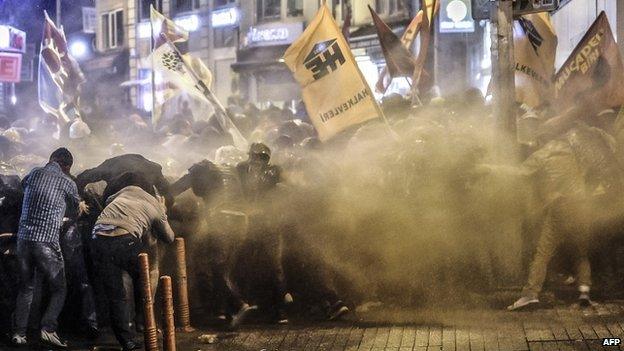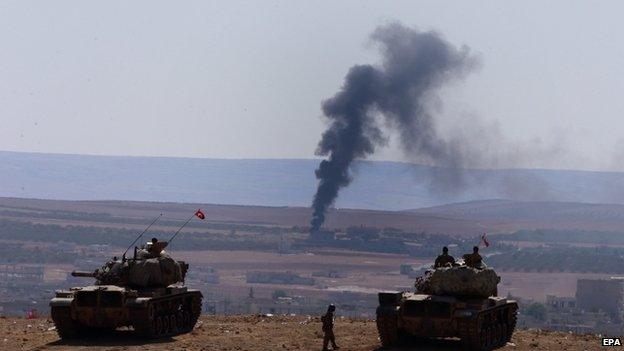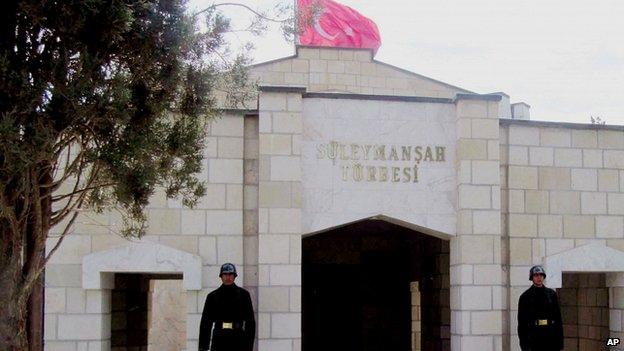Turkey's fear of a reignited Kurdish flame
- Published

Supporters of the Kurdish fighters in Kobane clash with police on the streets of Istanbul
Could Turkey be about to return to the bad old days of armed conflict with the Kurds?
Troops on the streets, curfews for the first time in 22 years, protests in almost 30 cities and state buildings attacked - the situation is dangerous and escalating fast.
Some of the fighting is among Kurds, between Turkey's Islamist Hezbollah group - which backs Islamic State (IS) - and supporters of the PKK, the banned Kurdistan Workers' Party, which is vehemently opposed to IS militants.
But the main protests - and the fiercest anger - are directed at the Turkish government.
Kurds feel Turkey sees them, rather than IS, as the real enemy.
They are furious at Turkish troops blocking them from crossing over into Syria to fight with the Kurdish militia there, the YPG.
And they believe Turkey would be happy to see the fall of Kobane if it meant Kurdish hopes for an autonomous entity in Syria went up in flames.
Turkey has a complicated relationship with its Kurdish population and Kurds in neighbouring countries
For now, Turkey refuses to budge. President Recep Tayyip Erdogan repeated yesterday that his country would only get more involved in Syria if the US-led coalition also targeted President Assad's regime, as well as IS.
And he said a no-fly zone had to be imposed to halt regime air strikes and help cope with the refugees.
The US state department reiterated that the coalition was focused for now on IS alone. And so Turkish troops are unlikely to spring into action.
Turkey turned against President Assad early on in the war, betting he would fall quickly.
But in so doing, Ankara was widely criticised for taking an "anyone but Assad" policy, backing armed groups which became ever more extreme.
An Islamist-leaning government here was seen as uncomfortably close to the Sunni Islamist militants in Syria, with weapons, fighters and resources crossing a once-porous border.
The Turkish government has, it appears, belatedly woken up to the threat posed by IS - mainly after the group kidnapped 46 Turkish citizens in June, holding them for more than 100 days.

Turkish tank crews watch the fighting over the border in Kobane, but are not intervening
But critics believe Ankara is still not serious about tackling the extremists.
"For us, the PKK and Isil are the same," said President Erdogan this week, using another term for Islamic State.
"It is wrong to consider them as different from each other."
The bitter legacy of conflict between the Turkish state and the Kurdish minority here goes a long way towards explaining Turkey's inaction in Kobane.
Ankara fears helping the Kurdish militia in Syria, which is closely allied to the PKK, itself still labelled a terrorist organisation by the West.
Some 40,000 people were killed in the Kurdish insurgency here from the 1980s on, and although a peace process with the Turkish government was launched recently, it is fragile.
The crisis in Kobane has shaken it dramatically.

Some Turkish soldiers are already in Syria, guarding an Ottoman tomb north-east of Aleppo
Abdullah Ocalan, the imprisoned leader of the PKK, has said if Kobane falls to IS, it will spell the end of the peace process.
President Erdogan has invested considerable political capital in a Kurdish settlement. With parliamentary elections looming next year, his government fears a backlash if peace breaks down.
And so Turkey is at a critical juncture in its much-criticised Syria policy - failure to intervene in Kobane could feed spiralling protests, strain already tense relations with Washington and sound the death knell for long-lasting peace with the Kurds.
Sending in troops could prompt retaliation by militants across a long and vulnerable border or against Turkish soldiers guarding an Ottoman tomb in Syria, to which IS is said to be close.
Turkey is already embroiled in the chaos south of the border and 180,000 refugees have flooded in from Kobane.
But the impact has spread fast and risks reigniting flames that this country will struggle to put out.